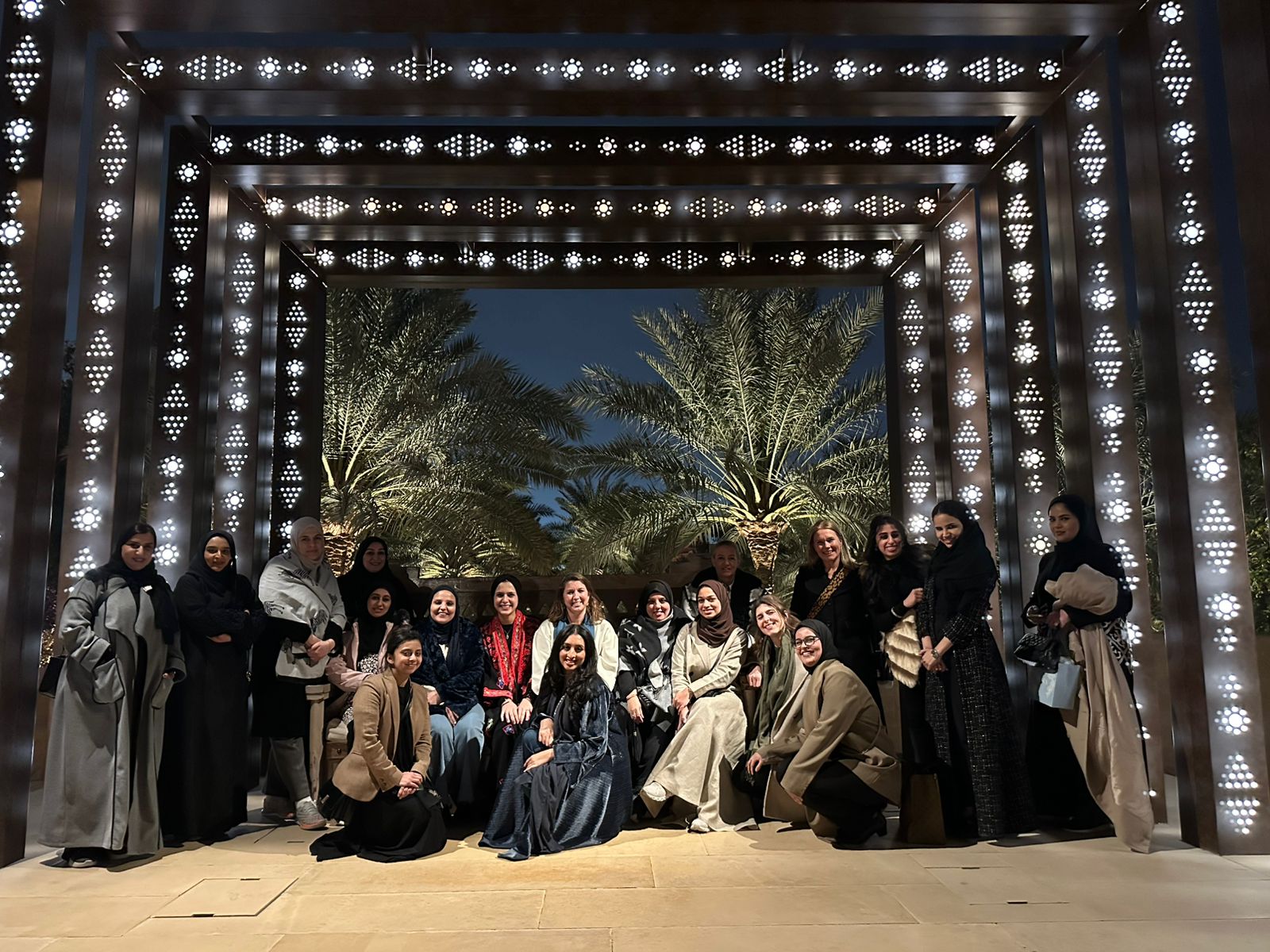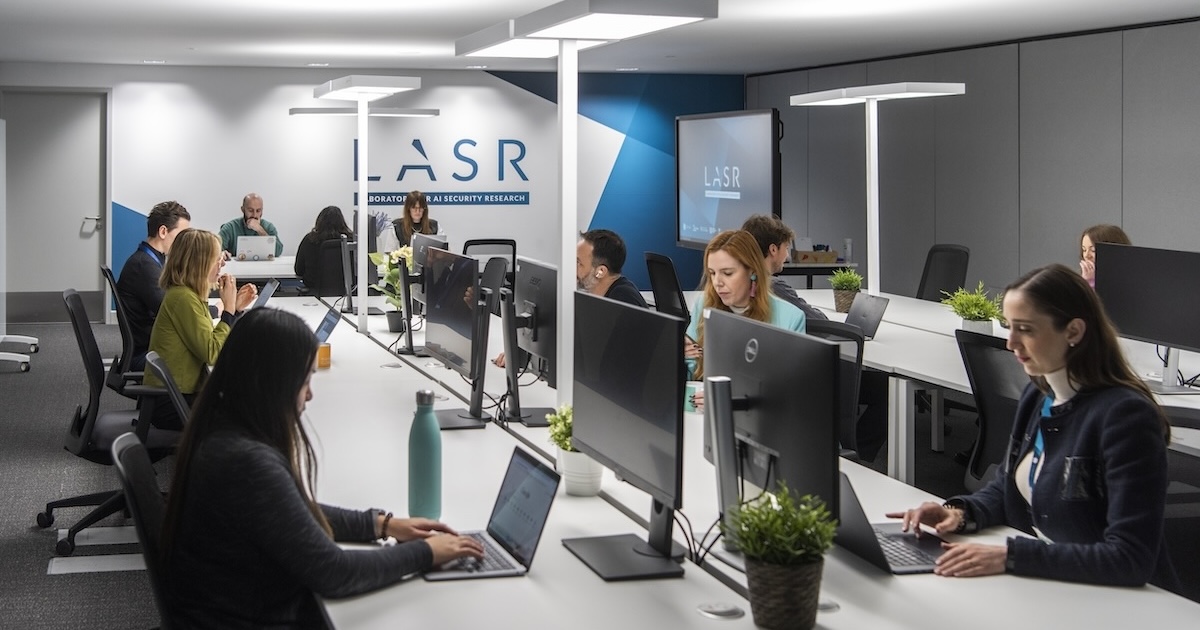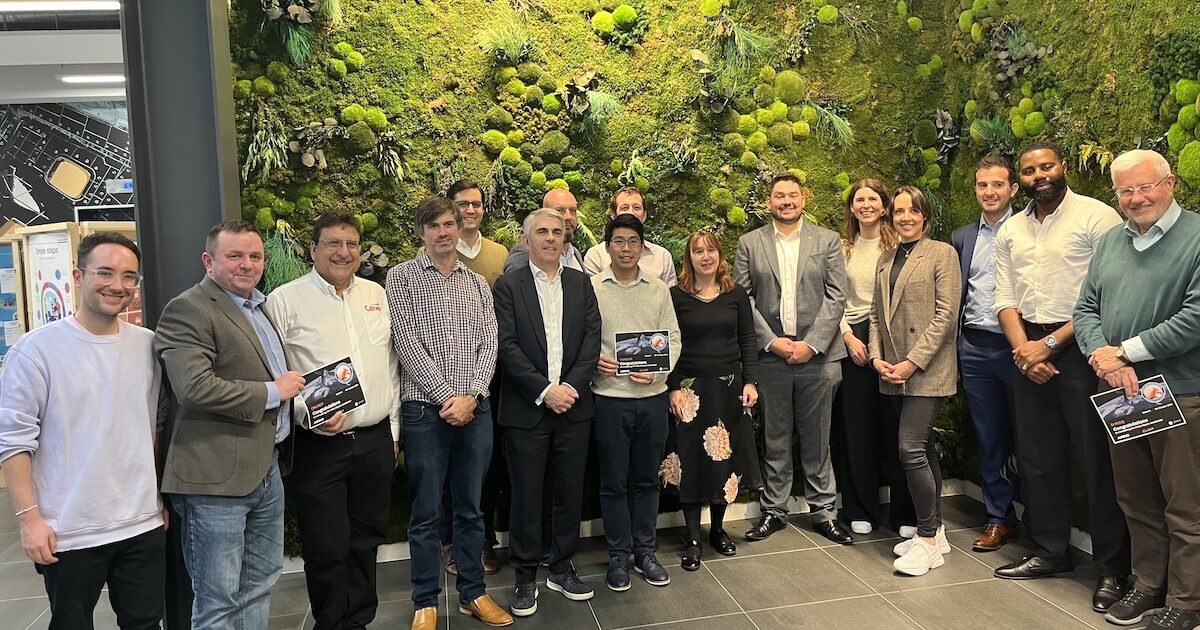Since it started, the UK-Gulf Women in Cybersecurity Fellowship has brought together women working in academia, governments and industry – from engineers and policymakers to communicators – and created an environment where they can collaborate, develop as leaders and make firm friends for life.
Fellows from across the Gulf Cooperation Council (GCC) countries – including The Kingdom of Bahrain, the State of Kuwait, the Sultanate of Oman, the State of Qatar, the Kingdom of Saudi Arabia and the United Arab Emirates, as well as Jordan, have written books, found the confidence to speak to senior leadership about their ideas, mentored each other, spoken on a global stage and pushed themselves – safe in the knowledge that they have a community of supporters who are cheering them on.
Funded by the Foreign, Commonwealth and Development Office (FCDO), the Fellowship has also involved experts and innovators from the UK and around the world who have shared their insights and ideas.
As our latest fellows graduate from the programme, we’re shining a light on the projects they’ve worked on – while revisiting the journeys our alumnae have been on since they’ve graduated. In their own words, fellows through the years have shared how they have become more confident and empowered leaders who are using their voice to make change happen. Anonymised reflections have been highlighted throughout the article.
The fellows continue to meet in person and connect through the Women in Cybersecurity Middle East Group, which was created by alumna Dr. Reem Al Shammari – who was named Cybersecurity Woman of the World 2024 – to boost the participation of women in the Middle East in cyber.
“[The Fellowship] has really empowered me and has made people at work take me more seriously. Now when we run campaigns no one goes to my manager, everyone comes to me. That feels good. I feel like I got what I really needed out of this programme: to grow and become better at what I do and be an ambassador for cyber security within my organisation.”
Syndicate Group projects from the graduating fellows 2024-2025
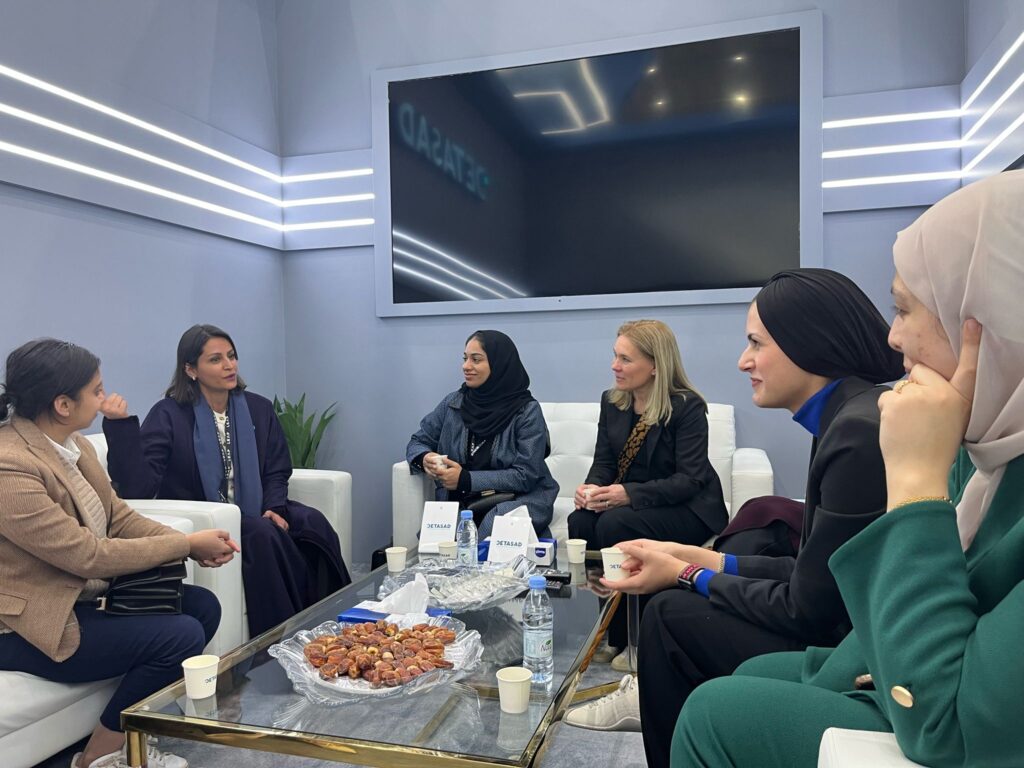
Awareness
The fellows knew that scams affect some of the most vulnerable people in society and many people who fall victim to a scam feel embarrassed and don’t know what they should do next to protect themselves. The fellows wanted to do something about this, so after surveying people about their current levels of awareness around scams they designed and delivered a campaign on social media platforms and WhatsApp. Launched at the start of Ramadan (when scams are particularly rife), the campaign educated people about what to do if they become the victim of a cyber scam.
“It has profoundly impacted my perspective and motivated me to take on leadership opportunities and present my ideas.”
The second campaign the group worked on was inspired by the alumnae of the Fellowship – women who were role models in the cyber sector. Fellows interviewed women they were particularly inspired by and the video interviews have been published on the eWaie website.
“The Fellowship has strengthened my leadership skills, expanded my professional network and changed my perspective on women-centric initiatives, showing me that they can focus on more than just gender issues and genuinely contribute to fields like cyber security and tech without taking away valuable opportunities.”
Innovation
Acknowledging the opportunity to improve clarity and accessibility in the cyber sector through more consistent definitions and the development of common Arabic terminology, the group agreed to create a glossary of common cyber terms in English and Arabic that would be widely understood. They explored how they might use AI to build a platform that would enable those working in cyber to find definitions for key terms in both English and Arabic and intend to publish the terms in the future.
“Engaging with peers and experts in cyber security across the region has bolstered my confidence, equipping me to take on more challenging roles and tasks.”
Cyber diplomacy and international partnerships
The fellows joined this group because they’re particularly interested in how they can have a voice on the world stage and influence the cyber sector in international forums. Fellows selected a UN norm for each country in the GCC and Jordan and undertook desktop research into how that norm is being implemented. At the in-person graduation event in Riyadh, fellows presented each of these norms and discussed the similarities and differences across the region. In some cases, fellows researched a country that they were not from, which helped them understand the different approaches to cyber security across the region.
“The UKGWICS Fellowship broadened my perspective on global challenges, emphasising leadership, collaboration, and innovative problem-solving. It has changed my perspective a lot and helped me gain confidence in taking on leadership opportunities.”
Research
AI is already having a profound effect on the education sector, and the fellows in the Research Syndicate Group wanted to know just how much – or little – guidance university students were being given when it came to harnessing its potential and protecting themselves from risks. The group collected survey responses and conducted interviews, using this to write a report and share their recommendations.
They concluded the report by recommending that policymakers define clear AI guidelines, provide training and raise awareness to ensure AI is being used ethically in universities.
“I have become more confident in my work, and I am now more encouraged to participate in more events.”
Fellows through the years: making connections and growing in confidence
From engineer to author
Sarah Abdullah Al-Hawaal, Senior Computer Engineer in the IT department at the Ministry of Defence in Kuwait, works in a technical role but was motivated by the Fellowship to write and publish a science fiction book that takes a storytelling approach to raising awareness about cyber threats encouraging people to consider the ethics of AI. Sarah said: “Sitting with fellows and mentors in the Awareness Syndicate Group and hearing about how previous fellows have also created a campaign to reach young gamers made me think about how we can educate both young and older people. I felt I had to do something that wasn’t part of my day job. The story I created is about cyber awareness but also how AI can be used for good and bad. It’s a story about humanity as well as technology.”
Sarah’s book can be purchased here: https://bit.ly/4ajAeja
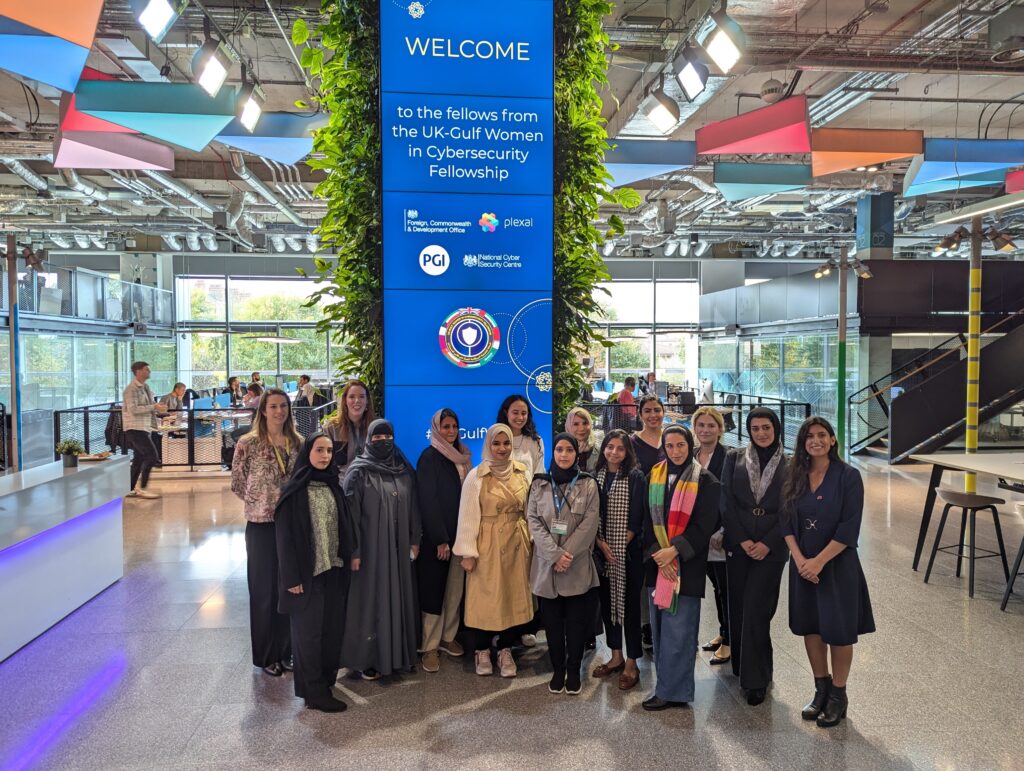
Co-creating more inclusive content with VIVIDA
Meeting fellows in London inspired Simeon Quarrie, the founder of immersive training startup VIVIDA, to create more inclusive 3D characters and content that would resonate with a Middle East audience. Simeon and his team worked with the guidance of alumna Shaima Al Hashmi, Cyber Security Lecturer at University of Technology and Applied Sciences in Oman, to develop 3D characters with headscarves and localised clothing who would be immersed in situations and locations that were specific to the Middle East.
“We had already been commissioned to create a solution for a client in Bahrain but what we explored, on the back of meeting the fellows, was how we could go beyond just subtitles to localise and make sure people really saw themselves being reflected in the content more. Shaima even jumped on a call with our developers to go through designs,” Simeon said.
Inspired to innovate
Through both in-person events and virtual sessions, the programme has connected fellows with the best of the UK startup ecosystem – and left them excited about the innovation coming out of the UK. Rawiya Albarwani, CISO at the Ministry of Energy and Minerals in Oman, is exploring a proof of concept with a UK quantum startup and was inspired to have conversations with colleagues about the organisation’s quantum readiness. Meanwhile Salwa Alessa, CISO at DETADAD, is looking to bring innovative UK technology into her organisation.
Elsewhere, Dina AlSalamen, former VP and Head of the Cyber and Information Security Department at Bank ABC, was encouraged by the Fellowship to host a discussion with leaders from the financial services sector in Jordan to explore how the sector needs to innovate to safeguard against tomorrow’s cyber threats, which also drew on insights from the UK.
Leaders who are making change happen
Fellows have spoken on the international stage, created their own communities and made their voices heard.
A Fellowship project that explored the cyber skills gap in the GCC was picked up by the British Embassy to inform the design of a skills-related competition in Oman and fellows have created educational videos on cyber security that have been viewed by Omani pupils. This has also enabled collaboration and information sharing pathways between curriculum owners in both Oman and Qatar, spearheaded by participating fellows.
“I feel more confident now to step into leadership, for example using the public speaking skills from the Fellowship to speak on a panel recently. Before I had the knowledge, but I didn’t have the confidence.”
In another year, fellows from six countries participated in the UN’s Open-ended Working Group on the use of Information and Communication Technology and delivered impassioned statements on the role of Arab women in cyber on the world stage.
Meanwhile, Dr. Fatemah Alsewaidi, Assistant Professor at the Public Authority for Applied Education and Training, presented a report created during the Fellowship analysing data privacy legislation in the region at Kuwait’s flagship Cybersecurity Education and Research Conference (CERC). This is attended by high-level dignitaries and officials in academia, government and civil society.
As we mark the graduation of our latest fellows, we celebrate the extraordinary achievements and enduring impact of the UK-Gulf Women in Cybersecurity Fellowship. This community of innovators, leaders and changemakers continues to shape the future of cyber security across the region and beyond. We look forward with excitement to the ideas, collaborations and breakthroughs that’ll emerge from this inspiring network of alumni.
